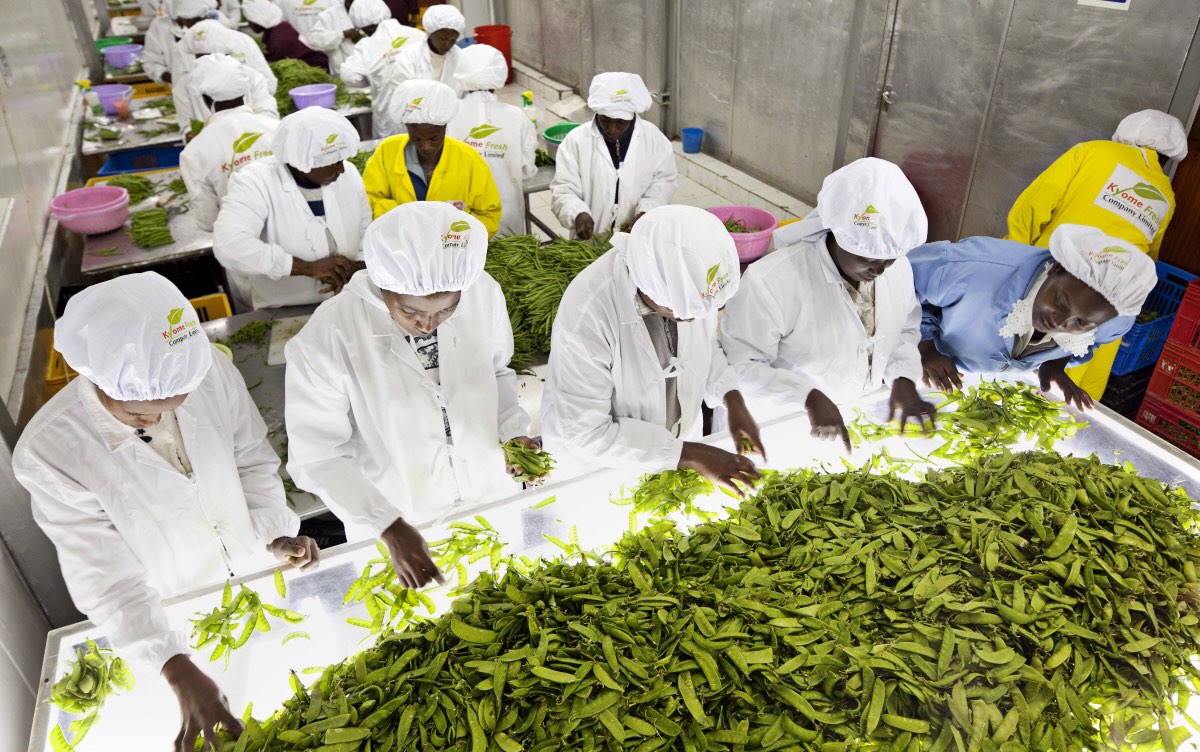Food supply systems have changed dramatically over the past half century, with enormous advancements in distribution systems, processing technologies, and delivery of services. As systems once based entirely on agriculture become steadily more industrialized, diets have changed. People are eating more and more processed foods and are more likely to use food services outside of their homes. This is increasingly the case in developing countries. These trends are responses to changing food demand and also drivers of that demand, including the rise of a global middle class and rapid urbanization.
While many people in the developing world now have ample access to more diverse food choices than they did a few decades ago, too many remain left behind. Similarly, while markets offer some healthy choices, inexpensive, unhealthy processed foods are a huge and highly profitable business.
Food sectors are also economically crucial in many countries, and increasingly so in the off-farm parts of supply chains. They also employ significant numbers of workers, and the development of agri-food value chains can contribute critically to solve the jobs and poverty conundrums in Africa south of the Sahara and South Asia. However, modern food system development often also displaces small-scale businesses, limiting overall job growth potential.
What is really at stake in these massive changes?
First, there are issues related to market and industry structure. In many parts of food supply chains, market power is growing more concentrated, both nationally and globally. The largest food companies are, indeed, very large. Tesco, for example, the UK’s largest supermarket chain, commands nearly one third of the UK grocery market. The question is whether such a lack of competition in distribution systems is good for consumers and for employment and business opportunities in other parts of the food supply chain. In addition, modern food industries will be increasingly susceptible to the labor-displacing impact of technological change (mechanization and robotics) and increases in scale.
Second, it is important to ask how well the food industry is serving consumers and society more generally. Obviously, the term “food industry” covers a wide range of enterprises—from small-scale storage units and distributors to large-scale supermarket chains that integrate multiple stages of the supply chain, from small bakeries to giant food manufacturing plants, and from street vendors to food service companies with global reach. Some individual companies are placing a higher priority on social and environmental issues than they have in the past. At the same time, however, they still may have little incentive to build their business models around nutritious foods and balanced diets; rather, at larger scales companies are induced to capture ever larger market shares with products that satisfy consumer preferences (created or not) for convenient, sugary and salty processed foods. Longer supply chains also mean more food miles and larger ecological footprint. Thus, there are risks in promoting a “modern” food processing and distribution sector.
In the best-case scenario, many jobs will be created up and down the value chain, with benefits to consumers in the shape of cheap, safe, and nutritious food, and with companies adhering to high standards of corporate social responsibility. In the worst-case scenario, the food industry will on average reduce good job opportunities, promote unhealthy diets, and destroy the environment.
Several research questions emerge from these issues. Is a worst-case outcome more likely in poorer countries where governance may be weak, regulatory capture more likely, the food industry just beginning to emerge, and new food policies perhaps less well understood? What can public and private sector stakeholders do to avoid such a scenario and turn both business and consumer decisions toward healthier and sustainable food choices? How effective and efficient are subsidies for “nutritious foods” and taxes on “non-nutritious foods” over the long term? Are food labels certifying healthy and/or environmental standards effective at driving markets in ways that better align profits with protection of the health of people and planet? How can agri-food supply chains become dynamic job generators?
To date, little research has focused on these critical questions or on food industries in general, particularly at the mid-stream (food processing, distribution, and food services). To fill this knowledge gap, IFPRI has launched a new research program on Food Industries for People and Planet (FIPP). This program will provide evidence-based policy assessments aimed at making agri-food industries and food systems more inclusive in employment and income opportunities, more efficient in meeting global food needs, and more conducive to the promotion of healthy diets and environmentally sound production and distribution systems.
Such an overhaul of the global food system is clearly an ambitious undertaking, requiring commitment, support, and knowledge-sharing from governments, food companies, research organizations, and civil society actors. The FIPP program aims to bring this wide range of stakeholders together at several events to build partnerships and identify priority research questions.
A roundtable and research day event held in Washington in June 2018 focused on establishing the strategic vision for the program and resulted in agreement to create a multi-stakeholder research consortium to drive the program. In partnership with the Global Alliance for Improved Nutrition (GAIN) and the Scaling Up Nutrition (SUN) Business Network, FIPP also presented a side event at the IFPRI-FAO Accelerating the End of Hunger and Malnutrition conference in Bangkok in Nov. 2018. This event focused on how research can be used to enable global, regional, and national business environments for healthy and sustainable food. A third FIPP roundtable event takes place in Brussels on Feb. 20, in collaboration with the Center for European Policy Studies (CEPS) and LICOS Center for Institutions and Economic Performance to begin building the European chapter of the research consortium.
For further information on this program, please visit the FIPP webpage or contact ifpri-fipp@cgiar.org to provide input or inquire about joining the research consortium.
Rob Vos is Director of IFPRI’s Markets, Trade, and Institutions Division (MTID).







